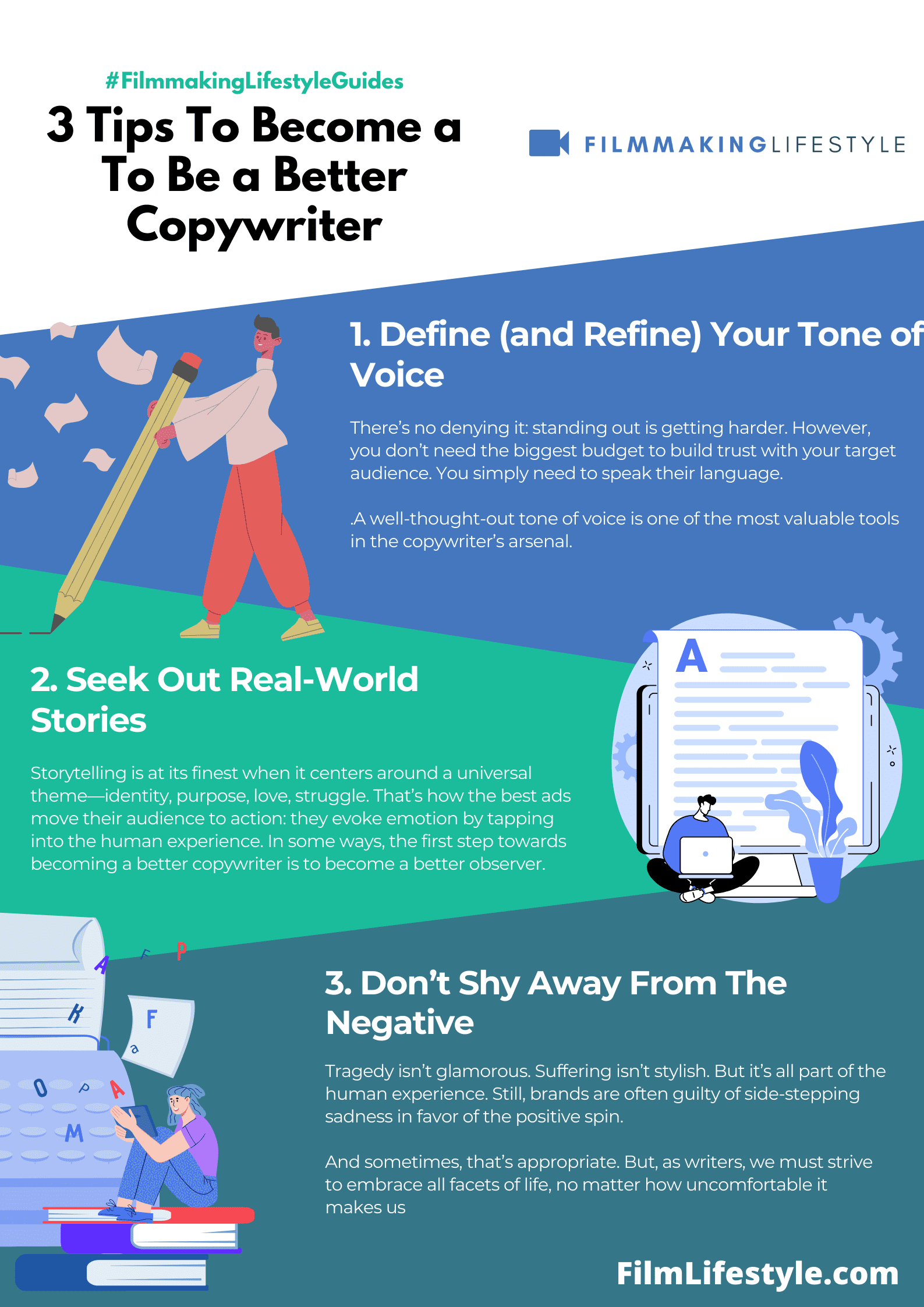This is an article we saw on Reddit by user betterwords and thought would be a good fit here. We do cover copywriting a lot here, but until now haven’t had a solid resource for learning copywriting. So we’re re-posting here.
In the article, the various methods and strategies to become an incredibly well paid copywriter are discussed. Take it away, betterwords!
So you wanna become a copywriter? Here’s my advice… This isn’t a job ‘anyone’ can do. You need to develop skills. You can start with no experience, but that doesn’t mean you’ll get paid. Plus a loophole to get around that problem.
Quick about me: I make a living as a copywriter. I do pretty well. I set my own schedule and make plenty for my family and I to live comfortably (wife and 1 year old daughter).
My whole schtick is targeting rational audiences with copy that is logically compelling. I want people to act in their best interest.
No manipulative bullshit. I’ve been able to generate fantastic results for my clients, so this somewhat contrarian approach seems to be working.
Yesterday I replied to the thread asking what everyone does and mentioned that I was a copywriter. I got a ton of DMs asking for information about learning how to do this.
When the first one came in, I was about to start writing an article for a site I’m working on where I hope to help people write better copy. In my head I’ve always been more focused on helping other entrepreneurs, but there is no reason the advice couldn’t help people become copywriters.
Since I needed inspiration for the article anyway, I went ahead and wrote one answering that first person’s question. By the time I logged on reddit last night, there were a bunch more people asking the same thing.
And today I had great feedback, including someone telling me to post it here. So here goes…
How To Become A Copywriter, Even If You Are Starting With No Experience
Copywriting can be an incredibly rewarding career.
I mean, the list of pros are pretty damn great:
- You set your own schedule
- You can work from anywhere that you want
- The upside earnings potential is in the millions (for truly top-level talent)
Don’t get me wrong, it’s not all sunshine and rainbows.
You’ll have to put in a lot of work before you earn a decent income. In the absence of a boss telling you what to do, basic tasks can feel overwhelming and hard to get done.
And setting your own schedule isn’t the same as working 4 hours a week and still making a living.
But again, the long-term upsides are fantastic if you can get past the initial hurdles.
I’m assuming that’s why ‘how can I do that too?’ is the most common response when I tell people what I do.
So here’s the deal…
If you’re going to do this, I want you to do it well.
The world doesn’t need any more half-assed writers churning out content because they think it’s their ticket to working by the beach in Thailand while sipping frozen drinks and lounging in a hammock.
There are dozens of other guides out there that will teach you how to get low-paying writing jobs with no experience at all.
They’ll make it abundantly clear that you can start with absolutely no writing skills, and then remind you of the future riches you may earn.
You can follow their advice, but you’ll get stuck in the rat race. Thousands of other people are reading those same articles that all rehash the same tips and tricks.
They then flood ‘freelancer sites’ like Upwork and Guru and Fiver, wondering why they’re stuck toiling away with extremely low-paying jobs.
So instead of teaching you the quickest way to make money by telling people you are a copywriter, I want to show you how to actually become a good copywriter.
There’s a big difference.
First things first…
What the hell is a copywriter, anyway?
I suppose the simplest answer is just someone who writes copy.
But that begs the question, what exactly is copy?
What Is Copy?
If you look around the internet, almost everyone defines sales copy as the writing used to influence someone to make a sale. They’ll then dish out overused tips to write ‘ridiculously persuasive’ copy.
This view is too narrow. Writing great copy is more than just knowing how to write a persuasive sales page. It’s more than creating a compelling VSL. I’ve given this a lot of thought, and here’s a definition I’m comfortable with:
Good copy is the written implementation of a business’s marketing and branding strategy.
But what’s the difference between good and bad copy?
Here’s another area where I disagree with the definitions used by many people.
Most people care about ONE thing: did it convert? Are my sales higher, now?
I personally think there are THREE important components of good copy. It should be:
- Profitable
- Honest
- Sustainable
Yes, it does need to convert. That’s why I listed profitable up top. But I also think it should be honest and sustainable. Honesty is something you won’t find mentioned much when discussing copywriting, but I consider it a cornerstone of what I offer.
There’s Just Way Too Much Bullshit In The World
You can lie, trick, and deceive people to make money if you want. You can even generate massive returns in the process.
But I’d personally feel like shit doing it.
AND you can make just as much money, if not more, by being honest.
This leads directly into the third criteria, sustainability.
Your typical copywriter is entirely focused on making money in the present.
They rely on what people call a ‘salesy‘ approach. It works for their goal of short-term cashflow, but it’s also unappealing to the majority of people who read it.
The result is that you slowly lose (or simply don’t gain) authority and trust.
While these approaches may generate great returns at the beginning, they also ‘cool’ the majority of your market. You may quickly capture a few percent of your potential customers, but you also lose the other 98% in the process. Call me crazy, but I think copy should both sell now and set the business up for future success.
This isn’t too much to ask. It takes more work. It takes more time. But it’s doable, and the result is a sustainable business with fans, not just customers.
Now that all this is out of the way, let’s get back to the question that started this section. But let’s add a small but important word…
What the hell is a good copywriter, anyway?
A good copywriter is one part writer and one part marketer.
You’ll need to develop the skills of both if you want to be effective. You’ve probably seen people say that you don’t need writing skills to be a copywriter.
Or you may feel that you are destined to be a great copywriter because you are a good writer.
Neither one of these views is correct.
While you don’t need the best technical skills (grammar, punctuation, etc..), you still need to be good at capturing an idea with words.
The better you can do this, the more successful you will be. But being a great writer doesn’t mean you’ll be a great copywriter either.
You need to back those skills up with an equally impressive set of marketing abilities.
Even though I’m technically a copywriter, I have helped many businesses formulate their entire marketing strategy.
But I Don’t Have These Skills. How Do I Get Them?
If you don’t have these skills yet, I wouldn’t be worried at all. Most people who are practicing copywriters don’t even have these skills!
I recommend that you begin by devouring information relating to these topics.
There are a handful of books dedicated to copywriting that are a good place to start.
Keep in mind, you don’t have to agree with someone to learn from them. Many of the books that I have read on these topics have information that I disagree with, but it’s still useful for understanding what other people are doing.
Some good general copywriting books are:

- The Boron Letters by Gary Halbert
- The Copywriter’s Handbook by Bob Bly
- The Adweek Copywriting Handbook by Joseph Sugarman
Some good marketing and ad books include:
- Scientific Advertising
- Ogilvy on Advertising by David Ogilvy
- Influence: The Psychology of Persuasion by Robert Cialdini
On top of this, I also recommend that you start reading philosophy.
I majored in philosophy in college, and it has honestly contributed more to my success as a copywriter than anything else that I’ve done.
I developed a keen understanding of the power of words and the importance of word choice, but I also learned how to structure arguments in a logical and rationally compelling way. This has been invaluable. Finally, you can also read all the articles I post here on this site. I’ll be working hard to publish new content weekly, and it will all be geared towards teaching people how to write better copy and market more strategically.
If you agree with my anti-bullshit stance, you may find what I have to say worth reading.
As you consume all this information, take notes and put what you learn into practice.
I practice by critiquing almost every ad and piece of copy that I see, much to the dismay of some of my family members.
When you begin to pay attention, you will find that we are literally bombarded with advertisements. The opportunities to practice are endless.
When an ad captures your attention, think about what strategy being used to sell the product or service. How could this have been done better?
When you read a webpage, pay attention to the feelings and desires that it evokes. Look at the copy and try to find the strategy behind their words. Do you think they have been effective? Would you have done things differently?
And when you find great copy, capture it and keep it in a ‘swipe file’ to return to later. Take pictures, screen shots… whatever you need to do.
Getting Clients
I think the biggest problem with most ‘how to become a copywriter’ guides is that they simply tell you how to get your first client.
If you take anything away from this, let it be this:
If you want to be successful, you need to treat copywriting as a business.
In other words, you need a plan that covers the following:
- What is your value proposition?
- Are you going to target a specific niche? What about a specific type of copy?
- How will you get the attention of potential clients?
- How will you make them aware of the value that you provide?
- What can you show them to make them trust your claims?
- How will you complete the sale?
- How will you grow?
This doesn’t have to be sophisticated.
Before launching this website, I ran the majority of my business through email.
I don’t even have any personal social media accounts.
I simply send emails to businesses with bad copy. I provide outstanding service, then ask for referrals after a job well done. I use samples and social proof to gain their initial trust, and all invoicing is done through Paypal.
I’m still using this system, with an added layer of the website on top.
And right now you’re probably thinking, Yea, but what about Client 0!?
I get it.
Getting your first client sounds daunting. But you can literally do this through cold emails.
Your odds of success are dramatically increased if you can prove your abilities though.
It’s this catch-22 that trips so many people up. You need experience to get jobs, but you need jobs to get experience.
Businesses don’t want to hire people who don’t have any experience. There is too much risk.
But you know what there are a lot of in this world: businesses that are starting with ‘bootstrapped’ budgets. People who have great ideas, but no money to launch big.
If I were starting out all over again, these are the people I would target.
And I’d work for free.
I can feel the future shudder of the people who read that last line. It goes against almost all the business advice you’ve probably heard.
Never work for free.
People will only respect you if you charge them money.
And on and on and on.
Here’s the deal.
You can go ahead and waste hours and hours on Upwork. Apply to low-paying jobs for businesses that are trying to pay as little as possible.
The vast majority of your proposals will be rejected. Worst of all, your reputation is publically on the line and you have to deliver, no matter how difficult the clients you get are.
But if you’re smart, you’d be spending that time sending emails instead of proposals. Most people starting businesses are desperate for help. They just don’t have the money to hire people. Be friendly. Explain your situation. Offer to write their copy if you can use it as a portfolio piece.
There are plenty of forums online dedicated to startups and entrepreneurs. Go there.
Look for people starting businesses that sound like a good idea. Tell them what you like about what they are doing and why you are willing to help for free.
You may even be getting in on the ground floor of a successful future business. And odds are, these clients will come back to you with paid work once they are making money.
And if they turn out to be assholes, you can just quit working for them.
So let’s recap. The competition is lower. The people are more grateful. They can relate to your position because they are also struggling for recognition (which you will help them with). You’ll get portfolio pieces AND future clients.
Doesn’t this sound better than spending all day writing proposals to job posts that probably won’t be answered?
Matt Crawford
Related posts
2 Comments
Leave a Reply Cancel reply
This site uses Akismet to reduce spam. Learn how your comment data is processed.







I seriously love your site. Excellent colors & theme.
Thanks for the kind words, Mark. Appreciate it.